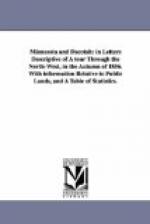transient? They will be truly told that he was
endowed, in a remarkable degree, with some moral qualities
which smoothed his course and charmed away opposition,
and with some physical advantages which happily set
off his intellectual gifts; that he was blessed with
a temper at once gentle and even; with a gracious
manner and a social temperament; that he was without
jealousy of the solid or showy talents of others, and
willingly gave them the amplest meed of praise; that
he spoke with all the grace of modesty, yet with the
assurance of perfect mastery over his subject, his
powers, and his audience; and yet they will scarcely
recognise in these excellencies sufficient reasons
for his extraordinary success. To me, the true
secret of his peculiar strength appeared to lie in
the possession of two powers which rarely co-exist
in the same mind— extraordinary subtlety
of perception and as remarkable simplicity of execution.
In the first of these faculties— in the
intuitive power of common sense, which is the finest
essence of experience, whereby it attains ’to
something of prophetic strain’— he
excelled all his contemporaries except Lord Abinger,
with whom it was more liable to be swayed by prejudice
or modified by taste, as it was adorned with happier
graces. The perfection of this faculty was remarkably
exemplified in the fleeting visits he often paid to
the trials of causes which he had left to the conduct
of his juniors; a few words, sometimes a glance, sufficed
to convey to his mind the exact position of complicated
affairs, and enabled him to decide what should be
done or avoided; and where the interference of any
other moral advocate would have been dangerous, he
often rendered good service, and, which was more extraordinary,
never did harm. So his unrivalled aptitude for
legal reasoning, enabled him to deal with authorities
as he dealt with facts; if unprepared for an argument,
he could find its links in the chaos of an index,
and make an imposing show of learning out of a page
of Harrison; and with the aid of the interruptions
of the bench, which he could as dexterously provoke
as parry, could find the right clue and conduct a
luminous train of reasoning to a triumphant close.
His most elaborate arguments, though not comparable
in essence with those of his chief opponent, Lord
Campbell— which, in comprehensive outline,
exact logic, felicitous illustration, and harmonious
structure, excelled all others I have heard—
were delivered in tones so nicely adapted to the minds
and ears of the judges, with an earnestness so winning,
and a confidence so contagious, that they made a judgment
on his side not only a necessity, but a pleasure.




